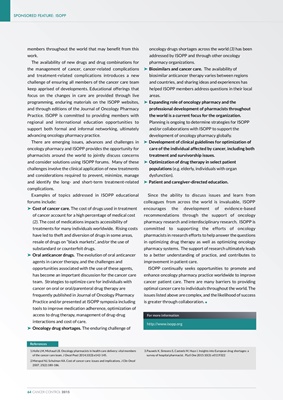
members throughout the world that may benefit from this
work.
The availability of new drugs and drug combinations for
the management of cancer, cancer-related complications
and treatment-related complications introduces a new
challenge of ensuring all members of the cancer care team
keep apprised of developments. Educational offerings that
focus on the changes in care are provided through live
programming, enduring materials on the ISOPP websites,
and through editions of the Journal of Oncology Pharmacy
Practice. ISOPP is committed to providing members with
regional and international education opportunities to
support both formal and informal networking, ultimately
advancing oncology pharmacy practice.
There are emerging issues, advances and challenges in
oncology pharmacy and ISOPP provides the opportunity for
pharmacists around the world to jointly discuss concerns
and consider solutions using ISOPP forums. Many of these
challenges involve the clinical application of new treatments
and considerations required to prevent, minimize, manage
and identify the long- and short-term treatment-related
complications.
Examples of topics addressed in ISOPP educational
forums include:
‰ Cost of cancer care. The cost of drugs used in treatment
of cancer account for a high percentage of medical cost
(2). The cost of medications impacts accessibility of
treatments for many individuals worldwide. Rising costs
have led to theft and diversion of drugs in some areas,
resale of drugs on "black markets", and/or the use of
substandard or counterfeit drugs.
‰ Oral anticancer drugs. The evolution of oral anticancer
agents in cancer therapy, and the challenges and
opportunities associated with the use of these agents,
has become an important discussion for the cancer care
team. Strategies to optimize care for individuals with
cancer on oral or oral/parenteral drug therapy are
frequently published in Journal of Oncology Pharmacy
Practice and/or presented at ISOPP symposia including
tools to improve medication adherence, optimization of
access to drug therapy, management of drug-drug
interactions and cost of care.
‰ Oncology drug shortages. The enduring challenge of
oncology drugs shortages across the world (3) has been
addressed by ISOPP and through other oncology
pharmacy organizations.
‰ Biosimilars and cancer care. The availability of
biosimilar anticancer therapy varies between regions
and countries, and sharing ideas and experiences has
helped ISOPP members address questions in their local
areas.
‰ Expanding role of oncology pharmacy and the
professional development of pharmacists throughout
the world is a current focus for the organization.
Planning is ongoing to determine strategies for ISOPP
and/or collaborations with ISOPP to support the
development of oncology pharmacy globally.
‰ Development of clinical guidelines for optimization of
care of the individual affected by cancer, including both
treatment and survivorship issues.
‰ Optimization of drug therapy in select patient
populations (e.g. elderly, individuals with organ
dysfunction).
‰ Patient and caregiver-directed education.
Since the ability to discuss issues and learn from
colleagues from across the world is invaluable, ISOPP
encourages the development of evidence-based
recommendations through the support of oncology
pharmacy research and interdisciplinary research. ISOPP is
committed to supporting the efforts of oncology
pharmacists in research efforts to help answer the questions
in optimizing drug therapy as well as optimizing oncology
pharmacy systems. The support of research ultimately leads
to a better understanding of practice, and contributes to
improvement in patient care.
ISOPP continually seeks opportunities to promote and
enhance oncology pharmacy practice worldwide to improve
cancer patient care. There are many barriers to providing
optimal cancer care to individuals throughout the world. The
issues listed above are complex, and the likelihood of success
is greater through collaboration. l
SPONSORED FEATURE: ISOPP
64 CANCER CONTROL 2015
References
1.holle LM, Michaud LB. Oncology pharmacists in health care delivery: vital members
of the cancer care team. J Oncol Pract 2014;10(3):e142-145.
2.meropol NJ, Schulman KA. Cost of cancer care: issues and implications. J Clin Oncol
2007, 25(2):180-186.
3.pauwels K, Simoens S, Casteels M, Huys I. Insights into European drug shortages: a
survey of hospital pharmacist. PLoS One 2015:10(3): e0119322
http://www.isopp.org
For more information